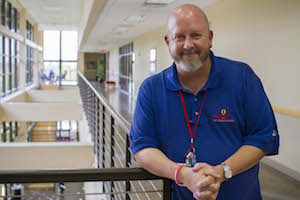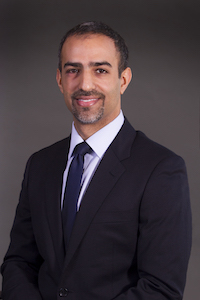Know the Signs of Stroke FAST

Bill Woodard
Bill Woodard remembers getting last minute items taken care of before his wedding in 2006. As most who are preparing for their nuptials, he was feeling stressed as he finalized a few things at work before leaving for the day’s events. Woodard, who was a DJ at a local radio station, was pre-recording his radio show when he noticed his speech was slurring. That would be his first indication that something was not right with his health. Woodard was suffering a stroke.
“At that moment, I had no other symptoms, no pain, no weakness,” Woodard said. “I was tripping over easy words and my speech became slurred. I even went up to a co-worker and said, ‘You are my witness. I am not drunk.’ My speech was sounding like I was. But I thought maybe I was having an allergic reaction.”
Woodard said he went on with the wedding ceremony and reception. The next morning he went to the hospital to get examined. By then, his blood pressure was 216/160, and his face was showing stroke symptoms of a droopy face and weakness. Physicians informed him that he had suffered a blood pressure related blockage in his brain that caused the stroke.

Yazan J. Alderazi, M.D.
Yazan J. Alderazi, M.D., an interventional neurologist at Texas Tech Physicians, said stroke treatments have to be administered quickly within the first few hours of symptoms.
“Recognizing symptoms of a stroke is important,” Alderazi said. “A stroke usually causes weakness on one side of the body in the face, arm or leg and may also cause problems producing or understanding speech.”
Alderazi said think FAST to remember the signs of a stroke. It stands for:
Face drooping
Arm weakness
Speech difficulty
Time to call 911
“Ask the person to smile,” Alderazi said. “In a stroke, the movement is unequal and one side of the face might droop. Lift the person’s arms to shoulder height and ask them to maintain it up for five seconds. If the arm drifts down on one side, this might be a sign of a stroke. Ask the person to repeat a simple sentence like ‘today was a nice day.’ If they are unable to repeat or have slurred speech, they can be having a stroke. Remember to act FAST! Quickly call 911 if the person shows any of these signs.”
Stroke is a type of brain injury due to problems in the blood vessels around the brain. The blood vessels can become blocked by a blood clot or a cholesterol plaque, leading to part of the brain being deprived of blood. The other type of a stroke occurs when a blood vessel ruptures causing bleeding inside or around the brain. This is hemorrhagic stroke, which is usually caused by high blood pressure or sometimes by a ruptured brain aneurysm.
“Thankfully, there have been major advances in the treatment and prevention of stroke,” Alderazi said. “New medications prevent blood clots more effectively and with fewer side effects. Additionally, advances in neuro-interventional procedures allow treatment of blockages to restore blood flow and treatment of aneurysms to prevent them from rupture.”
These procedures are called neuro-endovascular procedures because they involve treating the condition from within the blood vessel. Alderazi said after making a small incision of only a few millimeters in the skin in the upper thigh or in the arm, a thin long specialized tube called a catheter is inserted into the artery. This catheter is directed inside the blood vessels from the limb all the way up to the head and neck. Even smaller micro-catheters and devices are inserted through the main catheter to treat the brain problem. Using X-rays the neurointerventionalist can see the tiny devices and catheters to position them in the correct place.
“Despite advances in treatment, prevention is better than cure,” Alderazi said. “The best way to do this is to control the risk factors. We should get our blood pressure checked regularly at least every one to two years. I check mine a few days after my birthday so I don’t forget. If your blood pressure is high, check it more frequently and work with your doctor to get it under control. Controlling our cholesterol levels is also important. If you smoke, now is the right time to quit. Lastly, maintaining an active lifestyle with moderate exercise for at least 30 minutes most days of the week helps prevent stroke. A brisk 30-minute walk around the neighborhood every day will do for most of us. As an added bonus, controlling these risk factors also reduces the risk for heart disease and kidney disease.”
Controlling blood pressure and quitting smoking also may help prevent aneurysm growth and rupture. For some people, aneurysms run in their family. Alderazi said get checked out if you have had at least two immediate family members with a brain aneurysm. Also seek medical attention if you have a new, sudden extremely severe headache.
Woodard said he never imagined he had a blood pressure issue since he had never been hypertensive in the past.
“I now am back to about 85 percent of what I used to be physically,” Woodard said. “I suffer from fatigue, and to this day, I may have some problems with annunciating words. So I have to speak slower. In hindsight, I should have gone in to get checked much sooner.”
Related Stories
Celebrating Veterans: TTUHSC’s General Martin Clay’s Legacy of Service and Leadership
From his initial enlistment in the Army National Guard 36 years ago to his leadership in military and civilian health care management roles, Major General Martin Clay’s career has been shaped by adaptability, mission focus and service to others.
Texas Tech University Health Sciences Center School of Nursing Named Best Accelerated Bachelor of Science in Nursing Program in Texas
The TTUHSC School of Nursing Accelerated Bachelor of Science in Nursing (BSN) program has been ranked the No. 1 accelerated nursing program in Texas by RegisteredNursing.org.
TTUHSC Names New Regional Dean for the School of Nursing
Louise Rice, DNP, RN, has been named regional dean of the TTUHSC School of Nursing on the Amarillo campus.
Recent Stories
The John Wayne Cancer Foundation Surgical Oncology Fellowship Program at Texas Tech University Health Sciences Center Announced
TTUHSC is collaborating with the John Wayne Cancer Foundation and has established the Big Cure Endowment, which supports the university’s efforts to reduce cancer incidence and increase survivability of people in rural and underserved areas.
TTUHSC Receives $1 Million Gift from Amarillo National Bank to Expand and Enhance Pediatric Care in the Panhandle
TTUHSC School of Medicine leaders accepted a $1 million philanthropic gift from Amarillo National Bank on Tuesday (Feb. 10), marking a transformational investment in pediatric care for the Texas Panhandle.
Texas Tech University Health Sciences Center Permian Basin Announces Pediatric Residency Program Gift
TTUHSC Permian Basin, along with the Permian Strategic Partnership and the Scharbauer Foundation, Feb. 5 announced a gift that will fund a new pediatric residency.
